Abissi di luce
Before I return to the enumeration of my favorite singers, I want to write a bit about the first three sopranos on my previous list. I may very well not choose another ten favorite sopranos because I would have to eliminate far too many. I may decide to do a singer of the day type of thing as this blog unfolds. But in the meantime, I have scribbled a few lines about the three top singers on my list.
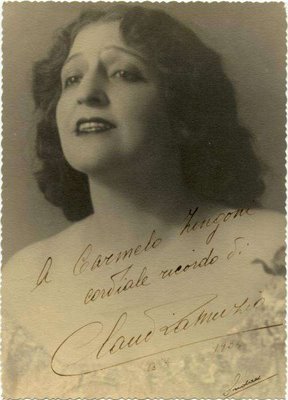
The first time I heard Muzio’s voice I was a freshman at St. Olaf College – the single year that I spent at that institution. The bookstore was having a sale on discontinued recordings. I bought two: a compilation of Ernestine Schumann-Heink and a selection of the best of the Muzio Edison diamond discs. Schumann-Heink I liked well enough, but I didn’t fully appreciate her until much later. The voice of Muzio, on the other hand, reached out from the crackling grooves and grabbed me by the throat. Lauri-Volpi called it a voice “made of tears and sighs and restrained interior fire.” Yup. In those earlyish recordings the color of the voice is beautiful in and of itself (see Bachelet’s “Chère Nuit”) but it is the way that she exposes the palpitating heart inside the music that reveals her true greatness. The aria that broke my heart was from Leoncavallo’s Zazà: “Dir che ci sono al mondo.” This remains in my opinion one of the greatest recordings ever made.
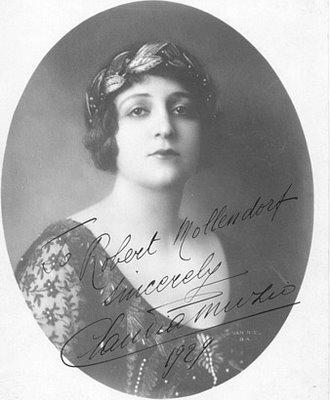
In fact, Muzio made several such discs that I’d put on my desert island list: The thrilling abandon of her “Dove son” from Catalani’s Loreley, the plangency and depth of her “Spiagge amate” from Gluck’s Paride ed Elena, the soaring climaxes of her “Sorgi o padre” from Bellini’s early Bianca e Fernando, all Edisons. Years later, I discovered her late recordings, which reveal a voice more or less intact but weakened by her own failing physical condition. Certain of her high notes go flat, the breath is often (but not always) short. There is, however, no trace of a wobble ever, and her artistry is transcendent. I have said many times to students, colleagues, friends, anyone who will listen, that one can give the illusion of spinning out an endless line no matter how many times one takes a breath. And I cite as an example these late Muzio recordings, in particular the two Otello duets with Francesco Merli, where she breathes practically every two bars and yet gives the illusion of one unending line.
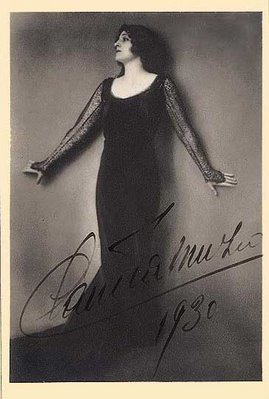 From this flawed treasure trove emerge several nearly faultless discs: In Donaudy’s “O del mio amato ben” she conveys a lifetime of heartbreak in just four minutes. I cannot listen to this recording without tears and having heard her rendition of this song, I simply cannot bear to hear anyone else attempt it. Even more poignant is her recording of the song “Ombra di nube” by Licinio Refice, a passionate plea for the dark clouds obscuring the sun to disperse. In her performance, heartbreak and hope meet in a way no other singer has ever surpassed, and few have equalled.
From this flawed treasure trove emerge several nearly faultless discs: In Donaudy’s “O del mio amato ben” she conveys a lifetime of heartbreak in just four minutes. I cannot listen to this recording without tears and having heard her rendition of this song, I simply cannot bear to hear anyone else attempt it. Even more poignant is her recording of the song “Ombra di nube” by Licinio Refice, a passionate plea for the dark clouds obscuring the sun to disperse. In her performance, heartbreak and hope meet in a way no other singer has ever surpassed, and few have equalled.
Two other iconic Muzio recordings are also of music by Refice, from his curious sacra rappresentazione, Cecilia, a liturgical opera written expressly for Muzio, and the last new role she took on. In and of itself, it’s pure trash. Without the contribution of a great artist like Muzio (or Scotto, who revived it in concert in the 70's) it is an embarrassment. Certainly no singer today would have the nerve, the fervor, or the fearlessness to attempt it.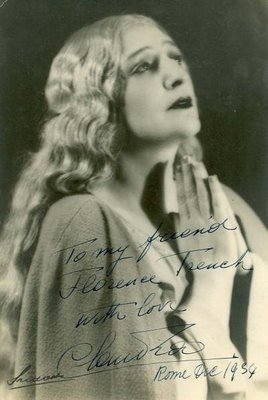
Yet Muzio’s records of two excerpts, an introductory “annunzio” of the birth of Cecilia, and the final tableau depicting Cecilia’s death, are without equal, perhaps the greatest recorded examples of her artistry. When her voice bursts forth after the long, rather turgid orchestral introduction to the annunzio it is the voice of an empathic angel that is nevertheless pure flesh and blood. She shapes and colors the words and the vocal line so lovingly, with such aching urgency that one has no choice but to be carried away. In the dramatic scene of Cecilia’s death, Muzio really does seem to be in a trance (the likes of which I have only experienced once in live opera, when I saw Stratas sing the second of her Suor Angelicas at the Met, not coincidentally another bit of Italian religio-trash, and one of my favorite operas). At Cecilia’s death Muzio ecstatically intones the words “giardini di luce, abissi di luce, fontane di luce” (gardens of light, abysses of light, fountains of light) and one is swept away in that same vision. In fact, I can think of no better description of her shatteringly beautiful voice than just that.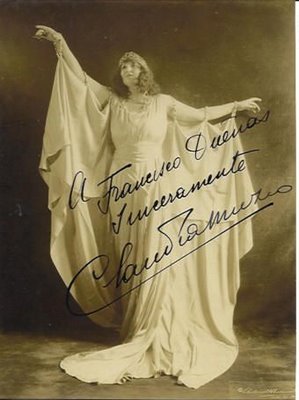
Labels: arias, breath control, claudia muzio, francesco merli, opera, operatic trash, refice, renata scotto, teresa stratas, vocal artistry, vocal technique

1 Comments:
Abysses of Light is such a wonderful image!
I have a disc of Muzio but know that I should be more familiar with her work.
Post a Comment
Subscribe to Post Comments [Atom]
<< Home